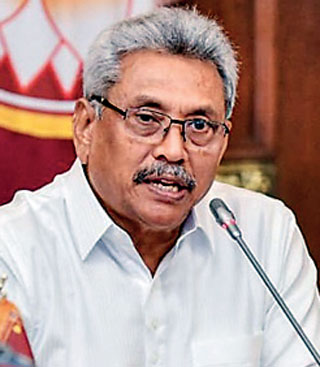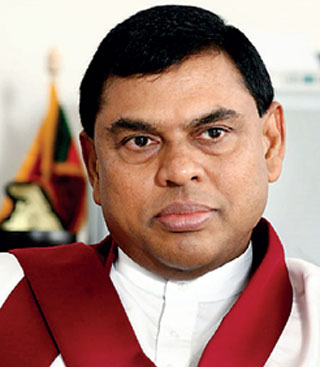Wednesday Feb 18, 2026
Wednesday Feb 18, 2026
Friday, 7 January 2022 00:00 - - {{hitsCtrl.values.hits}}

President Gotabaya Rajapaksa

Prime Minister Mahinda Rajapaksa

Finance Minister Basil Rajapaksa
 Let’s accept it, Sri Lanka cannot pay the loan instalments with the forecasted revenue earned. In other words, we are heading for bankruptcy.
Let’s accept it, Sri Lanka cannot pay the loan instalments with the forecasted revenue earned. In other words, we are heading for bankruptcy.
Essential food items are in the port but they cannot be cleared due to a shortage of dollars. Just to cite one example, the need in the market for milk powder is around seven metric tons but the supply chain window allocated less than two metric tons which tells us the challenge ahead. The food inflation was 17% in November but the number has crossed to 21% in December.
As you may be aware, many households are clustered in the poverty line and a simple economic shock will pull a bulk of households to poverty. Which is why the World Bank has estimated 500,000 people to be below the poverty line. The debt to GDP ratio is to hit 115% which will cover the public guaranteed debt too for the year 2021. China’s number is 54.4% which gives us an indication on the challenge ahead.
Million-dollar question
The million-dollar question is not why it happened, but the key question is how did one not forecast this scenario when the best brains in the country are in the public sector. Let me explain. If one wants to join the government, a good grade at a university is a must. In other words – a good A level grade, a class from a government university and a structured interview is mandatory. I have worked with the public sector and I have experienced the depth of thinking and quality of thinking in this group of people and I am wondering if the subject has been brought to the notice of the decision makers but has not been heeded just like the fertiliser issue.
One cannot say that this forecasted scenario was alerted to the political hierarchy as we saw the top end of academia being very vocal on this subject in the likes of Dr. Wijewardena the former Governor of the Central Bank and Coomaraswamy the former Governor of Central Bank in the interview with my teacher from Harvard – Ricardo Hausman. Let’s accept that the Government failed to listen.
It is sad how a government has slipped to lead the country, even though there is a two-thirds majority in Parliament and the person who led the country to beat the deadliest terror organisation – the LTTE, now being the President. I guess it’s a case in point for academia where a leader in one environment can be an absolute disaster in another. I guess it would be an interesting case study for an MBA student to do on the leadership styles and impact a leader can make in different surroundings.
Let’s drill down
If one does a deep dive, one hypothesis that can be arrived at is that the skills required to lead a military outfit and the skills that are required to lead a country are two totally different in nature. We see this in the world of business too, where a qualified salesman in one company does not shine out in a similar position in a different company.
An interesting observation that caught many people’s attention when it was reported on media was, whilst the queues for LPG and milk powder kept getting longer and the cry for fertiliser by the farmers across the country were getting louder, the President of the country was bestowed with the honorary title ‘Sri Lankadheeshwara Padma Vibhushana’ by the Kotte Sri Kalyani Samagi Dharma Sabha for outstanding performance. It was a strange situation given that when the DNA of the campaign trail was that remuneration was going to be totally performance based.
Whilst penning this piece the news came that a house in Wattala was on fire due to the faulty gas cylinder whilst a chicken farm lost 3,000 chicks due to a fire that was caused in a farm. Sadly, no action has been taken on who gave direction for the formulation change or for that matter the colossal loss the country is facing due to the mismanagement of this issue.
McKinsey survey
Whilst the private sector is grappling to understand the man-made market disasters, McKinsey released the latest survey on the 1,240 business leaders around the world. The insight was very interesting. Apparently 80% of respondents have voiced that ‘capacity building’ is the most important to the long-term growth of a company post the pandemic. The logic being that there was absolute disruption at the household end that has resulted in a new lifestyle emerging of a Sri Lankan housewife. This development has forced companies to re-look at their own business model and work practices.
The companies that were the most agile were able to exploit the opportunity in the market place and hence ended the year in double digit growth. The more outwardly driven operating entities like Singer and Keells Super were able to get the best returns from the market as a case in point. This intern had an impact on the year end financials of such companies that were very attractive.
Upskilling – order of the day
A further deep dive to the top performing companies in the last two years had done focused upskilling and sometimes re-purposing the lives which was a win-win to both the company and employees. The McKinsey study also revealed that companies must engage in training on a continuous basis. Each individual in the organisation gains the right combination of skills. The best case in point was seen in the world of brand marketing where the internet penetration had exceeded the readership levels. Which means that allocating more money to digital marketing and learning how each of the platforms like Instagram, Facebook (Metaserve) or LinkedIn can be engaged to make a brand top of mind to induce purchase.
Running a company
In this macro uncertainties we in business are trying to keep a straight face and run our organisations. Let’s accept it, the challenges that we are facing are more than running a company. Hence, the new term that has come to play in the business world is called ‘Chief Impact Officer’. Meaning it is not about getting things done but achieving the end objective.
Chief Impact Officer
The new catch phrase – Chief Impact Officer (CIO) is now held responsible for upholding the impact design of a category. As Francis J. Aguilar says, “Scanning the Business Environment” for Organisational impact, Socio Economic impact, Environmental impact, Political impact, Technological impact, Legal impact and Moral impact. In essence, staying true to the realities in the market place and one needs to fashion the organisation to the new realities.
Tough job
The job of a CIO is a challenge as to the volatility in the market. The logic being that to monitor the optical reality itself takes the steam out of a business executive as policymakers are taking decisions without any proper analysis. The best case in point was change to organic fertiliser that affected not only the farmer but the precious tea industry that is a 1.5-billion-dollar exchange earner for the country. To be honest, policy inconsistencies identified by the World Bank Doing Business Index have now catapulted at a different level.
Next step
Let’s stop analysing. Agree on daily KPIs and just ensure it is done. As per the McKinsey study focus on capacity development so that your key executives can take decisions whilst standing. Your new job is to be a Chief Impact Officer. Identify and reward those who are in this frame of mind.
(The thoughts are strictly the views of the author and have no links to the organisations he serves in Sri Lanka or in the South Asian region.)